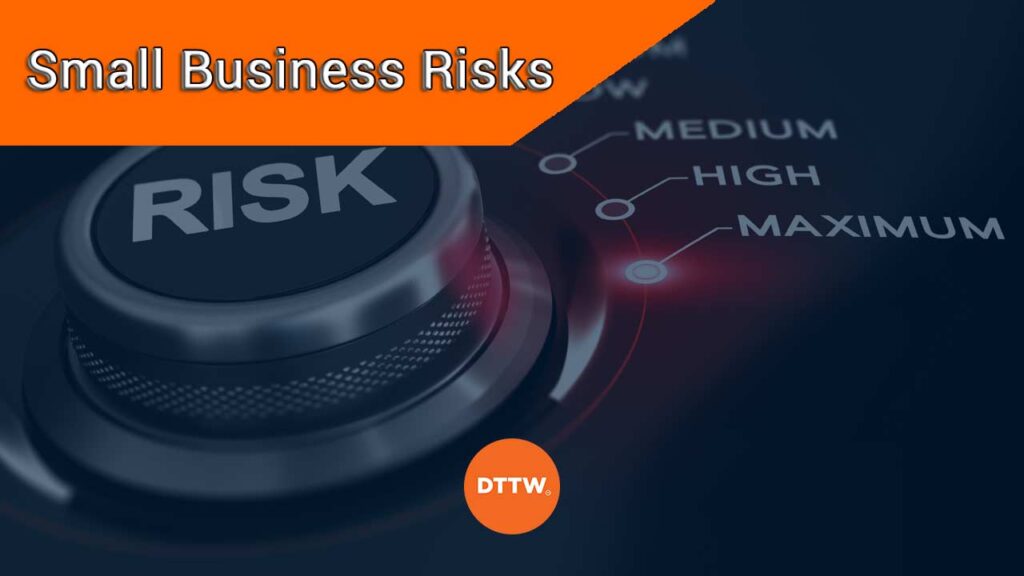Small businesses are much easier to set up than large multi-million dollar organizations. They focus more on growth and innovation rather than on survival. However, they don’t own the resources that big organizations own.
This is one of the reasons small businesses are more vulnerable and prone to challenges. If you’re already in business, know you’ll face many challenges and difficulties, but none will have the sort of impact that risks have on your small business.
Not to worry, some of these risks are more common than you think and may need more than small business loans to solve them.
In this article, you find some of the more common risks small business owners face, including best practices and tools that help them avoid and overcome them.
» Related: How to Start Day Trading
Table of Contents
Identifying Most Common Risks For Your Small Business
Every business faces risks right from the startup stage and throughout its lifecycle. However, some risks are more obvious to predict and identify.
Let’s identify the most common risks for your small business:
- Financial Risks: Financial is the biggest risk you can face as a small business owner. Most owners even rely on small business loans, while some use life savings to push their dreams. However, the lack of cash flow needed to maintain assets, operations, pay employees, and invest in growth could hurt the business and owners.
- Legal Risks: It is normal for small business owners to have little to no legal knowledge. But this lack of knowledge is in itself a common risk. They sign contracts without understanding them and face costs from potential legal actions.
- Reputation Risks: The risk to a small business’ reputation is often overlooked, but it could have damning effects on its longevity. Small businesses rely on reputation to grow, and if your company has only a negative reputation or none at all, don’t expect to grow much.
- Liability Risks: Incurring losses is standard for every business and industry, and sometimes these losses can pack up a business. Some examples of liability include customer/employee injury, defaulting on contracts or small business loans, or property damage. All of these could lead to expensive fines and lawsuits.
- Business Interruption Risks: Imagine a business or its suppliers having to stop its activities due to damages caused by a storm, earthquake, or global pandemic. It could affect the small business, prompting it to hold off operations until they do repairs or get new suppliers. Most companies don’t survive temporal closures with expenses piling and no positive cash flow, and some end up closing permanently.
- Cyber Security Risks: Nowadays, most small businesses operate partially or fully online. The internet makes a company fast and seamless, but a hack from a cybercriminal or the risks of data breaches could ruin a small business even with the best defenses.
» Related: The Best Cybersecurity Stocks
Some Tools That Can Help You To Face Them
The first step to tackling the most common small business risks is identifying them. After that, as a business owner, you need to equip yourself with some tools to help you face these risks. Look at some tools that can help you meet them:
- SWOT Analysis: Using an analysis of the Strength, Weaknesses, Opportunities, and Threat facing your small business can steer your company away from risks.
- Pivot Strategy: A pivot strategy is a great tool to help you successfully navigate your business through drastically changing market regulations. Begin with a plan A and pivot to a plan B when needed.
- Insurance: Insurance is one of the best ways to reduce small business risks, and nowadays, business owners have many insurance packages to choose from.
- SolveXia Analytical Tool: SolveXia is another way to help you identify, define, and efficiently monitor risk within your company.
Related » Benefits Of Incorporating Your Day Trading Business
Best Practices To Avoid Facing These Risks
If you require a little guidance, these are some best practices that every small business owner should follow to avoid facing these risks:
- Research and test new ideas before you try to launch them (the demo platform helps traders exactly for this reason)
- Always have insurance for your insurable assets, including business insurance.
- Don’t over-rely on only one third-party supplier, have alternatives in place (basically, diversify your portfolio).
- Monitor your reputation via your customer reviews and offer prompt customer service.
- Diversify your revenue streams by focusing on different products and customers.
- Save as much income as you can afford to save to serve as an emergency fund.
- Prioritize cyber security and use safe and secure internet connections/computers.
» Related: Risk Management Strategies fo Day Traders
Conclusion
Risks aren’t foreign to businesses, and they may well be all that stands between you and a profitable and long-lasting company. However, if you know how to identify, avoid, and deal with existing risks, you will thrive.
Keep in mind that small business loans are always available if you need financial help combating these risks.





